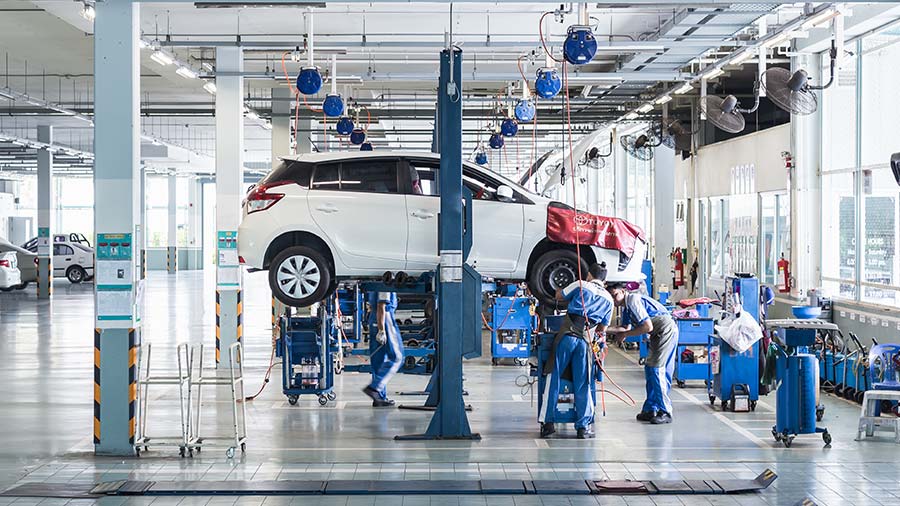In the fiercely competitive landscape of the Automotive Business, staying ahead requires a combination of innovation, adaptability, and strategic thinking. As the automotive industry undergoes rapid changes driven by technology, consumer preferences, and market dynamics, businesses must develop and implement key strategies to thrive in this dynamic environment. In this article, we explore some essential strategies that can empower automotive businesses to navigate challenges and seize opportunities for sustainable growth and success.

Embracing Digital Transformation
In the digital age, Automotive Businesses must embrace digital transformation to remain relevant and competitive. This involves leveraging advanced technologies such as Artificial Intelligence (AI), Big Data analytics, and the Internet of Things (IoT) to enhance various aspects of the business.
Implementing digital tools can optimize supply chain management, streamline production processes, and improve customer engagement. Additionally, integrating digital marketing strategies, such as search engine optimization (SEO) and social media campaigns, can enhance brand visibility and drive lead generation.
Diversifying Product Portfolio
A key strategy for Automotive Businesses is to diversify their product portfolio to cater to evolving consumer demands and market trends. Offering a range of vehicle models, from conventional internal combustion engines to electric and hybrid vehicles, enables businesses to capture a broader market share. Moreover, exploring new segments such as autonomous driving technology, connected vehicles, and mobility services can unlock new revenue streams and future-proof the business against market disruptions.
Customer-Centric Approach
Fostering a customer-centric approach is paramount for success in the Automotive Business. Understanding the needs, preferences, and pain points of customers enables businesses to develop products and services that resonate with their target audience.
Collecting and analyzing customer feedback and data can lead to product improvements and personalized experiences, fostering brand loyalty and advocacy. Building strong customer relationships also involves providing excellent after-sales support and engaging in proactive communication.
Investing in Research and Development
Innovation is the lifeblood of the Automotive Business, and investing in research and development (R&D) is crucial to drive continuous improvement and maintain a competitive edge. R&D efforts can lead to breakthrough technologies, improved safety features, and enhanced vehicle performance. Collaborating with universities, research institutions, and technology partners can accelerate innovation and ensure access to cutting-edge advancements.
Sustainability and Environmental Responsibility
As the world embraces sustainability, incorporating eco-friendly practices is not just a trend but a strategic imperative for Automotive Businesses. Implementing sustainable manufacturing processes, using recyclable materials, and reducing carbon emissions are essential steps towards environmental responsibility. Embracing green initiatives can not only attract environmentally conscious consumers but also comply with evolving regulatory requirements.
Strengthening Supply Chain and Partnerships
A resilient supply chain is the backbone of the Automotive Business. Strengthening partnerships with suppliers and ensuring a seamless flow of materials is critical to meet production demands and maintain product quality. Collaborating with strategic partners, such as technology providers and mobility service companies, can open doors to new markets and innovations. Building a network of reliable partners fosters agility and adaptability in an ever-changing market.
Talent Acquisition and Training
Having a skilled and motivated workforce is instrumental in driving the success of an Automotive Business. Talent acquisition and training should be focused on developing the expertise needed to work with cutting-edge technologies and meet the demands of the evolving automotive industry. Encouraging continuous learning and upskilling ensures that the business stays ahead in a rapidly changing landscape.
Market Intelligence and Competitive Analysis
Gaining insights into market trends and conducting competitive analysis is essential for Automotive Businesses to make informed decisions. Monitoring competitors’ strategies, pricing, and offerings can help businesses identify potential gaps and opportunities in the market. Market intelligence also aids in understanding consumer behavior and preferences, guiding the development of targeted marketing campaigns and product positioning.
Agility and Adaptability
In the fast-paced Automotive Business, agility and adaptability are critical attributes for success. The ability to respond swiftly to market changes, consumer demands, and technological advancements ensures that businesses remain relevant and competitive. Embracing agile methodologies in production processes and decision-making empowers businesses to capitalize on emerging opportunities and navigate challenges effectively.
Conclusion
In the ever-evolving Automotive Business, the key to sustainable growth lies in implementing strategic measures that align with market dynamics and consumer preferences. Embracing digital transformation, diversifying the product portfolio, fostering a customer-centric approach, investing in research and development, and prioritizing sustainability are essential strategies to drive success.
Strengthening the supply chain, acquiring and training top talent, conducting market intelligence, and staying agile and adaptable are crucial elements that empower automotive businesses to thrive amidst dynamic changes. By envisioning the future and strategically positioning themselves, automotive businesses can navigate challenges and unlock their full potential in the competitive landscape of the automotive industry.








